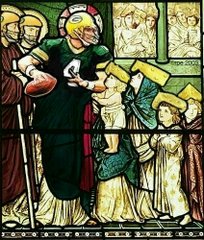 Dear People of God,
Dear People of God,If you would like to hear the sermon preached at Trinity Lutheran Church in Layton, Utah for the Ninth Sunday after Trinity, "How Much Do You Owe?," click on this MP3 audio link. The audio includes the Hymn of the Day, LSB #730, "What Is the World to Me?" The sermon begins at the 3:05 mark.
Have a great week knowing as one Baptized into Christ, though you owe everything to the Lord, He has wiped your debt clean and will never call you to account again.
A servant of the Word and His folk,
Pastor Hering
Here the preaching manuscript if you prefer to read along or read instead.
TEXT: "1[Jesus] also said to the disciples, "There was a rich man who had a manager, and charges were brought to him that this man was wasting his possessions. 2And he called him and said to him, 'What is this that I hear about you? Turn in the account of your management, for you can no longer be manager.' 3And the manager said to himself, 'What shall I do, since my master is taking the management away from me? I am not strong enough to dig, and I am ashamed to beg. 4I have decided what to do, so that when I am removed from management, people may receive me into their houses.' 5So, summoning his master's debtors one by one, he said to the first, 'How much do you owe my master?'" Luke 16:1-5
Dear people of God,
How Much Do You Owe?
• Mortgage-- the average homeowner owes $95,000
• Car loan-- the average new car loan is over $27600
• College-- The average college senior graduated this year with more than $19000 in debt.
• Credit Cards— The average American household with at least one credit card has nearly $10700 in credit-card debt.
• Total household debt--The average household has $117951 in debt.
• Share of Federal Debt-- $109,792 per household
Now *that's* a lot of debt!
But if you think about it, it isn't even a drop in the bucket compared to what we owe our master, God the Father of us all. After all, what do you have that has not been given to you? Do you think you have earned and deserve all that you have in this world? Think again.
The parable Jesus presents in our Gospel text today is all about debt. On the face of it, commends a hired hand for acting dishonestly to save his own hide when he realizes how unmanageable his debt has become. Unless we understand what is going on around this parable we walk away from it thinking it is a lesson on dealing with our finances and investments in this world in order to win friends and influence people, because in doing so we somehow are feathering a heavenly retirement nest. But as always, in reading the Scripture and hearing the Word of God, if all we get out of it is what we have to do to pay off our debt and gain access to our heavenly home, we leave ourselves on the outside of the window looking in.
The very first words of our Gospel text that introduce this parable of the "steward of unrighteousness." are very important. They tell us Jesus has turned from addressing the Pharisees and is speaking to His disciples. However, we also must remember that the Pharisees are still present. They are listening in as Jesus teaches, i.e. catechizes His disciples. But they are not listening in to gain wisdom and understanding, they are listening in to gather testimony against Jesus because He is nothing but trouble for them and they seek His death. So Jesus teaches His disciples in a parable that makes for one of those difficult and cloudy texts, impossible to understand apart from other parts of Scripture that clear the clouds.
As Jesus himself warns the Pharisees on another occasion, "You search the Scriptures because you think that in them you have eternal life; and it is they that bear witness of me, yet you refuse to come to me that you may have life. John 5:39 40
Furthermore, let us remember that earlier in chapter 9 of His Gospel Luke indicates a point in Jesus ministry where He clearly is heading to Calvary and needs to prepare His disciples for that day:
Now it came to pass, when the time had come for Him to be received up, that He steadfastly set His face to go to Jerusalem, and sent messengers before His face . . . to prepare for Him. "For the Son of Man did not come to destroy men's lives but to save them." Luke 9:51- 56
So, here in today's parable we have Jesus catechizing His disciples, preparing them for His death on the cross and His subsequent departure, which will leave them in charge of proclaiming and spreading the message of the kingdom of heaven. This He does with a parable so that hearing, the Pharisees will not understand, because they do not recognize Him as the Christ, who by His crucifixion is THE key to understanding all of Scripture -- and therefore, also this parable.
Now that we have an idea of what is going on here, let us take a closer look at the story Jesus tells. For today, rather than getting all caught up in the details in the middle, let's focus on the beginning and the end of the story. It is at the beginning and the end that we see what is truly happening and why.
The parable begins: ""There was a rich man who had a manager, and charges were brought to him that this man was wasting his possessions."
The word "charges," i.e. accusation, is very important here for two reasons.
1. Nowhere in the parable do the charges become fact born out by evidence.
2. The person or persons making the charges are never revealed.
The Greek word for "accusation" here is "diabollo," the same word from which we get the devil's name. Satan was our accuser before the throne of God until Jesus ascended victorious to cast Him out of heaven, and throughout His ministry the Pharisees were Christ's accusers. Keep this thought in mind, we will come back to it shortly.
But now, let us take a quick look at how Jesus closes the parable: "The master commended the dishonest manager for his shrewdness."
Here the Greek word so often translated "shrewd" is perhaps better understood by us as "prudent" or even "wise."
What was so prudent and wise about the steward's actions toward the debtors? It could only be the forgiving of their debts. Here is the nugget of the story that prepares the disciples for what is to come, that journey to Jerusalem to which Jesus had steadfastly set His face that He might be received up on the cross to forgive the debts of a sinful world that owes the Master, the Lord their very lives. It is the same nugget that leaves the Pharisees shaking their heads and leads to their being the agents for Christ's death.
These Pharisees were continually trying to trap Jesus, accusing Him of sinning against the Scriptures and blaspheming God and His name. Eventually they succeeded in making their accusations stick--at least in the realm of this unrighteous world. The result was that the only righteous one among us was slain on a cursed tree to bear the unrighteousness of those He came to serve. Jesus, the very Son of God who knew no sin and was falsely accused, became sin for us so that He could pay the price and wipe out all our debt before His father, the rich man and Lord of Heaven to whom we all owe our very lives and all that we have.
On the cross, Jesus the Christ, the steward of unrighteousness--that is, the one who managed our sin and bore its consequences for us--begged His Father, the master of the estate, "Father forgive them, for they know not what they do."
He paid our debts, delivering us from sin and bondage to the accuser. Having done so, He is received up into heaven where He has prepared a place for us to live with Him forever. And having completed His task of clearing away the slate of our debt, He sends us forth as His forgiven people to deliver that forgiveness to others that they may know all accusations the evil one brings against them have been wiped clean as well.
This is what we pray in The Fifth Petition of the Lord's Prayer as recorded in Matthew 6:12: "And forgive us our debts, as we forgive our debtors." What does this mean? "We pray in this petition that our Father in heaven would not look at our sins, or deny our prayer because of them. We are neither worthy of the things for which we pray, nor have we deserved them, but we ask that he would give them all to us by grace, for we daily sin much and surely deserve nothing but punishment. So we too will sincerely forgive and gladly do good to those who sin against us."
So, dear people of God, I ask you again, "How Much Do You Owe?"
And the answer is, "nothing!"
That is what Baptism is all about. The forgiveness for which Jesus begged His Father as He poured out His blood saying, "forgive them, for they know not what they do."; the forgiveness of which Jesus spoke when He cried out on the cross, "It is finished!" is poured over your head in Holy Baptism.
That is what the Sabbath Day preaching and teaching of the Word in the Divine Service is all about. Once again, after a week or more of having the world pile the weight of supposed debt upon you, our dear Lord proclaims to you that you owe Him nothing. Your debt has been paid by His dear Son. You are forgiven.
And, of course, that is also what the Sacrament of Holy Communion is all about as well. In the body and blood of Christ, the One Who bore and paid off your unbearable and unpayable debt for you, you are being given the very body and blood by which He made your payment so that you owe nothing to Father.
And in that body and blood of Christ, as well as in Holy Baptism and God's Word of absolution that forgive you all your sins, you are receiving what you could never earn or pay off—a forever home in heaven—in the name of the Father, and of the Son, and of the Holy Spirit. Amen






No comments:
Post a Comment